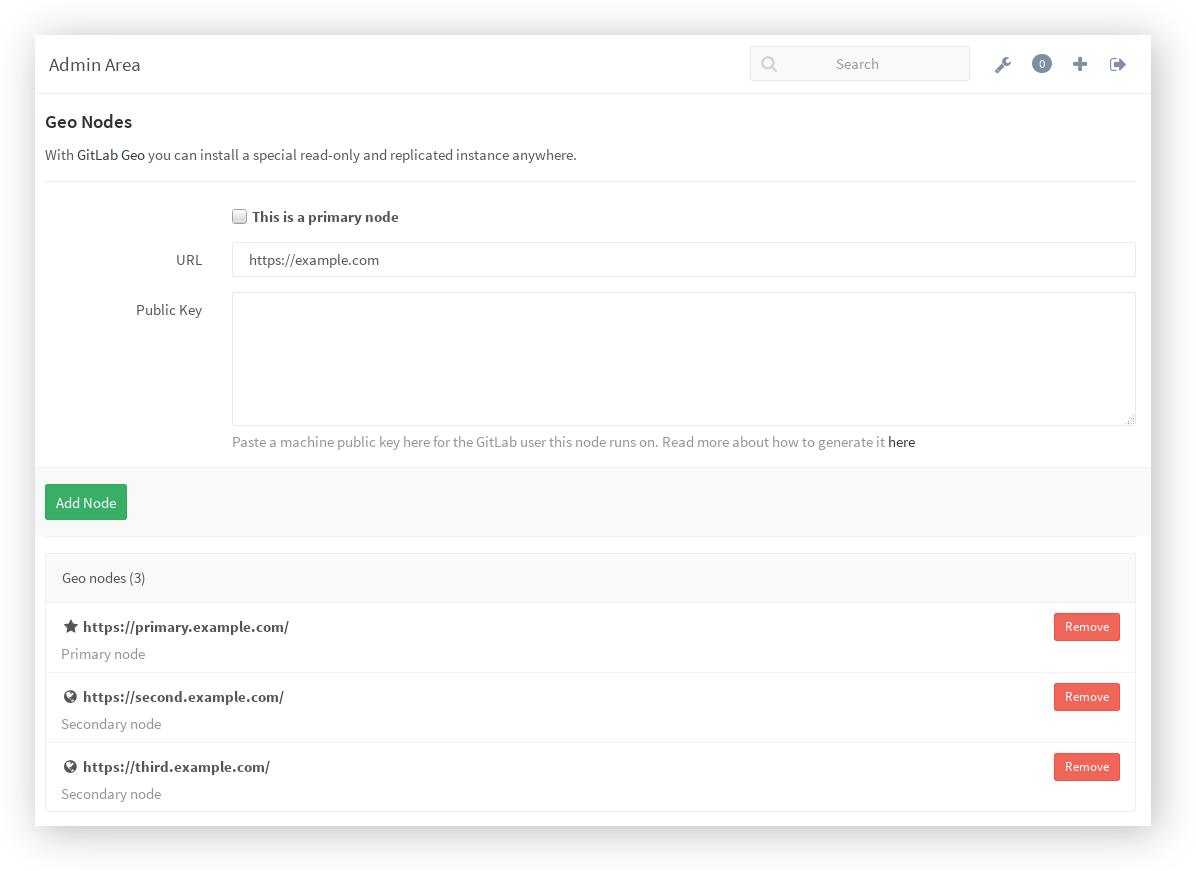GitLab Geo configuration
By now, you should have an idea of GitLab Geo and already set up the database replication. There are a few more steps needed to complete the process.
Table of Contents generated with DocToc
- Repositories data replication
- Create SSH key pairs for Geo nodes
- Primary Node GitLab setup
- Secondary Node GitLab setup
Repositories data replication
Getting a new secondary Geo node up and running, will also require the
repositories directory to be synced from the primary node. You can use rsync
for that. From the secondary node run:
# For Omnibus installations
rsync -avrP root@1.2.3.4:/var/opt/gitlab/git-data/repositories/ /var/opt/gitlab/git-data/repositories/
gitlab-ctl reconfigure # to fix directory permissions
# For installations from source
rsync -avrP root@1.2.3.4:/home/git/repositories/ /home/git/repositories/
chown -R git:git /home/git/repositories
chmod ug+rwX,o-rwx /home/git/repositories
where 1.2.3.4 is the IP of the primary node.
If this step is not followed, the secondary node will eventually clone and fetch every missing repository as they are updated with new commits on the primary node, so syncing the repositories beforehand will buy you some time.
Create SSH key pairs for Geo nodes
When adding a Geo node you must provide an SSH public key of the user that your
GitLab instance runs on (unless changed, should be the user git). This user
will act as a "normal user" who fetches from the primary Geo node.
Run the command below on each server that will be a Geo node (primary or
secondary), and paste the contents of id_rsa.pub to the admin area of the
primary node (Admin Area > Geo Nodes) when adding a new one:
sudo -u git -H ssh-keygen
Remember to add your primary node to the known_hosts file of your git user.
You can find ssh key files and know_hosts at /var/opt/gitlab/.ssh/ in
Omnibus installations or at /home/git/.ssh/ when following the source
installation guide.
If for any reason you generate the key using a different name from the default
id_rsa, or you want to generate an extra key only for the repository
synchronization feature, you can do so, but you have to create/modify your
~/.ssh/config (for the git user).
This is an example on how to change the default key for all remote hosts:
Host * # Match all remote hosts
IdentityFile ~/.ssh/mycustom.key # The location of your private key
This is how to change it for an specific host:
Host example.com # The FQDN of the primary Geo node
HostName example.com # The FQDN of the primary Geo node
IdentityFile ~/.ssh/mycustom.key # The location of your private key
Primary Node GitLab setup
Note: You will need to setup your database into a Primary <-> Secondary (read-only) replication topology, and your Primary node should always point to a database's Primary instance. If you haven't done that already, read database replication.
Go to the server that you chose to be your primary, and visit
Admin Area > Geo Nodes (/admin/geo_nodes) in order to add the Geo nodes.
Although we are looking at the primary Geo node setup, this is where you also
add any secondary servers as well.
In the following table you can see what all these settings mean:
| Setting | Description |
|---|---|
| Primary | This marks a Geo Node as primary. There can be only one primary, make sure that you first add the primary node and then all the others. |
| URL | Your instance's full URL, in the same way it is configured in gitlab.yml (source based installations) or /etc/gitlab/gitlab.rb (omnibus installations). |
| Public Key | The SSH public key of the user that your GitLab instance runs on (unless changed, should be the user git). That means that you have to go in each Geo Node separately and create an SSH key pair. See the SSH key creation section. |
First, add your primary node by providing its full URL and the public SSH key you created previously. Make sure to check the box 'This is a primary node' when adding it. Continue with all secondaries.
Secondary Node GitLab setup
Note: The Geo nodes admin area (Admin Area > Geo Nodes) is not used when setting up the secondary servers. This is handled by the primary server setup.
To install a secondary node, you must follow the normal GitLab Enterprise Edition installation, with some extra requirements:
- You should point your database connection to a replicated instance.
- Your secondary node should be allowed to communicate via HTTP/HTTPS and SSH with your primary node (make sure your firewall is not blocking that).
Database Encryption Key
GitLab stores a unique encryption key in disk that we use to safely store sensitive data in the database.
Any secondary node must have the exact same value for db_key_base as defined in the primary one.
For Omnibus installations it is stored at /etc/gitlab/gitlab-secrets.json.
For Source installations it is stored at /home/git/gitlab/config/secrets.yml.
Authorized keys regeneration
The final step will be to regenerate the keys for .ssh/authorized_keys using
the following command (HTTPS clone will still work without this extra step).
On the secondary node where the database is already replicated, run the following:
# For Omnibus installations
gitlab-rake gitlab:shell:setup
# For source installations
sudo -u git -H bundle exec rake gitlab:shell:setup RAILS_ENV=production
Troubleshooting
Setting up Geo requires careful attention to details and sometimes it's easy to miss a step.
Here is a checklist of questions you should ask to try to detect where you have to fix (all commands and path locations are for Omnibus installs):
- Is Postgres replication working?
- Are my nodes pointing to the correct database instance?
- You should make sure your primary Geo node points to the instance with writting permissions.
- Any secondary nodes should point only to read-only instances.
- Can Geo detect my current node correctly?
- Geo uses your defined node from
Admin > Geoscreen, and tries to match with the value defined in/etc/gitlab/gitlab.rbconfiguration file. The relevant line looks like:external_url "http://gitlab.example.com". - To check if node on current machine is correctly detected type:
sudo gitlab-rails runner "Gitlab::Geo.current_node", expect something like:#<GeoNode id: 2, schema: "https", host: "gitlab.example.com", port: 443, relative_url_root: "", primary: false, ...> - By running the command above,
primaryshould betruewhen executed in the primary node, andfalseon any secondary
- Geo uses your defined node from
- Did I defined the correct SSH Key for the node?
- You must create an SSH Key for
gituser - This key is the one you have to inform at
Admin > Geo
- You must create an SSH Key for
- Can primary node communicate with secondary node by HTTP/HTTPS ports?
- Can secondary nodes communicate with primary node by HTTP/HTTPS/SSH ports?
- Can secondary nodes execute a succesfull git clone using git user's own SSH Key to primary node repository?
This list is an atempt to document all the moving parts that can go wrong. We are working into getting all this steps verified automatically in a rake task in the future. :)

